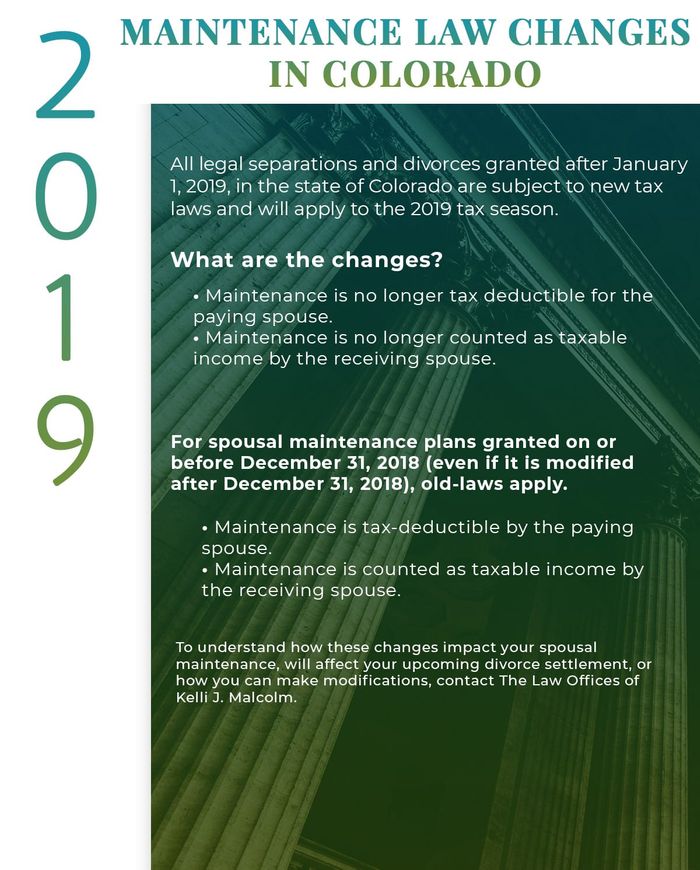Spousal Maintenance
Spousal Maintenance - Understand Spousal Maintenance
Spousal maintenance, is financial support awarded from one spouse to another in the event of a divorce. Find out what rights you and your spouse are entitled to. Let me help you calculate things fairly.

In a marriage, couples generally share assets and support each other, emotionally and financially. In the event of a divorce, this disruption in support may cause an unfair shift in how each party in the relationship are able to live. Spousal maintenance, Colorado’s version of alimony, is meant to help bridge these financial gaps. Spousal maintenance may be awarded during the divorce proceedings — or it may last for years.
Equal Partners Under Colorado Law
It is important to understand several factors of Colorado divorce that heavily influence spousal maintenance. First, Colorado is a “no-fault divorce” state. What this means is that there does not have to be blame awarded or a justified reason for the dissolution of marriage. One, or both parties, can simply request a divorce. Maintenance is awarded after Colorado has awarded property distribution from the marital estate. This means that regardless of how long a couple is married, assets that were obtained during the relationship should be divided fairly. While this does not necessarily mean evenly or equally, it does mean that division should not favor one party over the other.
After the property division, awarding and calculating spousal maintenance awards will include many different factors that include, but are not limited to:
- Financial resources available to each spouse
- The lifestyle of the marriage and ability to retain that in divorce
- Distribution of the marital property in the divorce proceeding
- Both parties’ income, employment, and ability to seek employment
- Custody of children
- Duration of the marriage
- Age and health of both spouses
- Contributions each party has made to the marriage
“Working with Kelli J. Malcolm, LLC was by far an extremely pleasant experience for me. Ms. Malcolm was kind, compassionate, fair, and extremely professional. I would HIGHLY recommend her Law Firm.”
~ Myria G.
Get The Legal Support You Deserve From A Family Lawyer You Can Trust.
Understand Your Rights in Divorce
If you are going through the divorce process, you should have an experienced divorce attorney on your side. If you think you are due spousal support or your spouse is demanding maintenance that you are not sure you owe, contact the Law Office of Kelli J. Malcolm. I can help you understand the Colorado divorce process and what the courts will use to calculate spousal maintenance in your divorce. Schedule your consultation today.
Colorado Spousal Maintenance FAQ
- How is spousal support determined in Colorado?
- Colorado law uses formulas to determine the amount of spousal support owed to each spouse. The general formula provides for a monthly payment to the lower earner of 40% of the higher earner's monthly adjusted gross income minus 50% of the lower earner's adjusted gross income. Spousal support can change over time, known as modifications.
- How long do I have tp pay alimony?
- Colorado alimony (spousal support) is based on the number of months of marriage and ranges from a few months for a marriage lasting three years to 10 years for a marriage lasting 20 years. Some factors may change this including remarriage or change in financial status.
- How does adultery affect alimony in Colorado?
- No. Colorado is a no-fault state, which means that the court doesn't care about why a marriage failed. The court will not consider any evidence of marital misconduct or adjust spousal support amounts based on behavior and actions. This means that those who commit adultery can both be held responsible for spousal support or receive it.
- How can spousal support be terminated?
- In Colorado, the termination of spousal support will happen in the event of a death of either party, the end of the maintenance term, the remarriage of the receiving party, or a court order terminating the maintenance.
